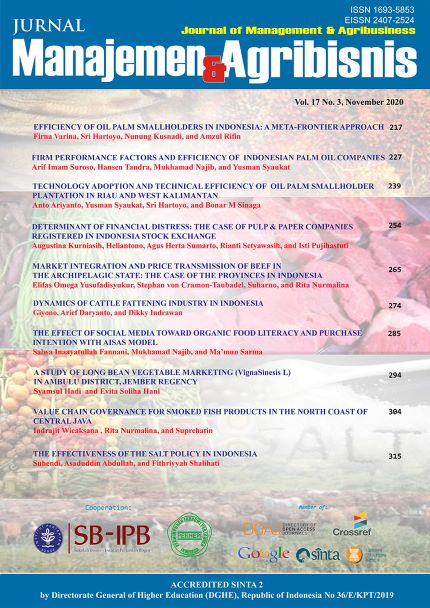VALUE CHAIN GOVERNANCE FOR SMOKED FISH PRODUCTS IN THE NORTH COAST OF CENTRAL JAVA
Abstract
The seafood and aquaculture industry in Indonesia is much less vertically coordinated. However, there are trends towards coordination in fishery value chains through processing and distribution to retail and food service customers. This study aims to examine the governance of the smoked fish value chains in the North Coast of Central Java. The study used the survey data of 52 actors along the smoked fish value chains in the North Coast of Central Java, including fisherman in Demak and Rembang regencies, various types of middleman, processor, and retailers in Semarang. The data was analyzed using value chain mapping and governance analyses. The results showed that the actors involved in the smoked fish value chains consist of fishermen, wholesalers, collectors, processors, retailers, food stalls, and restaurants. Each actor has different activities in their role to add value to differentiate smoked fish products. The results also showed that the types of value chain governance of smoke fish in the North Coast of Central Java leads to relational governance with the complex and interdependent transactions.
Keywords: aquaculture, coordination, fisherman, fishery products, relational
Authors
Authors who publish with this journal agree to the following terms:
- Authors retain copyright and grant the journal right of first publication with the work simultaneously licensed under a Creative Commons Attribution License that allows others to share the work with an acknowledgement of the work's authorship and initial publication in this journal.
- Authors are able to enter into separate, additional contractual arrangements for the non-exclusive distribution of the journal's published version of the work (e.g., post it to an institutional repository or publish it in a book), with an acknowledgement of its initial publication in this journal.
- Authors are permitted and encouraged to post their work online (e.g., in institutional repositories or on their website) prior to and during the submission process, as it can lead to productive exchanges, as well as earlier and greater citation of published work (See The Effect of Open Access).

